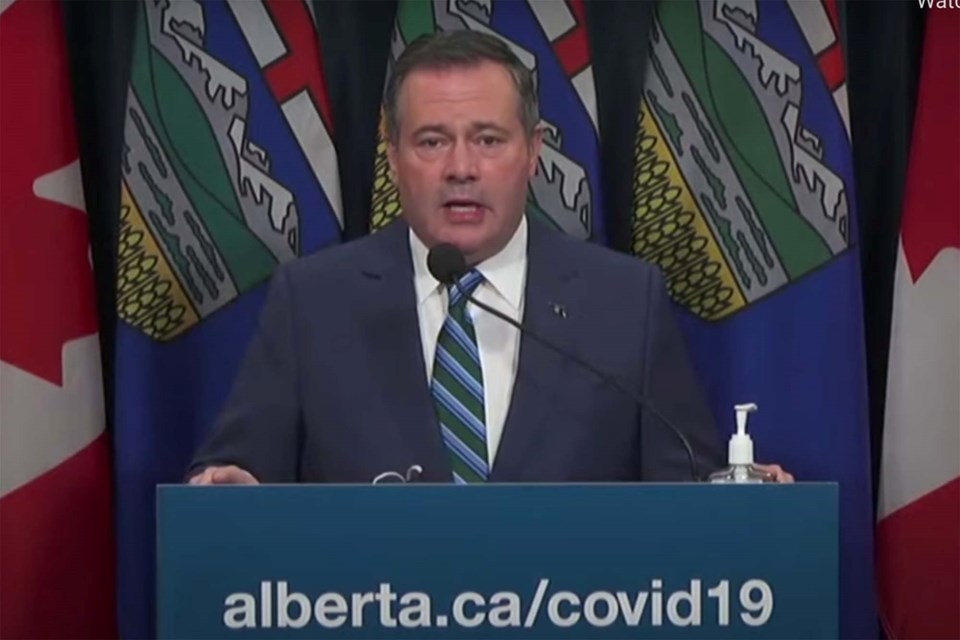Premier Jason Kenney is cautiously changing some COVID restrictions for Christmas.
In a press conference on Wednesday, Dec. 15, Kenney announced two immediate changes to the current indoor social gathering restrictions.
Gathering restrictions remain at 10 people, ages 18 and over, but the two-household cohort limit and vaccination requirement has been removed.
“This means that you can get together with 10 different adults from more than two households. Children and youth 17 and younger will not count towards that ten-person limit,” he stated.
Until today, Kenney said, Alberta was the only province to prohibit social gatherings of those who are unvaccinated, which was leading to widespread non-compliance.
“Now with 90 per cent of adults having some level of vaccine protection, we believe it is no longer necessary,” he said.
Even with the new restrictions, Kenney said Alberta has some of the most stringent rules in the country and the new restrictions would put the province in line with everyone else.
Kenney said he wants to further relax the restrictions.
“I was hoping to do so before Christmas, but regrettably what we are expecting in terms of Omicron spread requires we be cautious and prudent in the weeks to come,” he said.
The Omicron variant has been detected in 77 countries around the world three weeks after first being reported.
Kenney said researchers are working to learn more about Omicron, but there are still many unknowns, including the risks of serious outcomes and the effectiveness of vaccines against the variant.
What is known about Omicron is it spreads easily and is more likely to cause breakthrough infections.
Kenney said it is “significantly more transmissible than the Delta variant,” but early evidence suggests Omicron does not cause severe illness at the same rate as Delta.
“This is encouraging, and it is a reason not to panic,” he said. “However, because of its extraordinarily high rate of transmission, it might still represent a risk to our health-care system.”
The update from Alberta's chief medical officer of health, Dr. Deena Hinshaw, was more dire as she warned Albertans how serious the Omicron variant could become in the province.
“Twice before in this last year we have faced a new variant so we have seen what can happen with a new and more infectious version of the virus,” she said.
Hinshaw said we must learn from our past and referenced the fourth wave that has only just begun to abate in the province.
“I cannot overstate the importance of having learned from that experience and the need to be extremely cautious as we learn more about the Omicron variant,” she said.
Hinshaw said with the much larger number of people infected, the overall impact in ICUs is still rising in other parts of the world where Omicron is spreading fast.
“Said in a different way: Even if the risk of each individual case needing ICU care is lower, if the total number of cases is much larger the total acute-care impact would be expected to be significant.
Hinshaw said she knows there are no risk-free solutions, and the impacts of restrictions are real.
“I also know we face a very real risk of experiencing a significant fifth wave with this new variant that could be worse than previous waves in terms of the overall impact on our health system due to sheer volume of cases,” she said.
Hinshaw said though it may be tempting to make exceptions to the rules, indoor social gatherings are the leading cause of spread in the province.
Apart from following the new restrictions, there are additional ways people can make holiday gatherings safe.
Hinshaw suggested people wear masks when not eating and spread seating further apart to maximize the distance between households. She also recommended increasing the air circulation.
Hinshaw said it is critical for those who are unwell to neither host nor attend a gathering.
Rapid tests are also available for Albertans to use before attending or hosting a gathering
Starting Dec. 17 Albertans will be able to get free rapid antigen test kits from select pharmacies and Alberta Health Services locations across the province.
Each person will be limited to one box of five tests every two weeks, but they will be able to pick up one additional box for someone in their household if they have the other person's Alberta health care number.
More than 500,000 kits will be available on a first-come, first-served basis.
The tests cannot be used for the restrictions exemption program or for travel as they do not include the appropriate documentation.
The province also announced an increase in booster eligibility.
Starting Dec. 15 Albertans aged 50 and older and all health-care workers can book a third dose of an mRNA COVID-19 vaccine if they received their second dose at least six months before.
COVID-19 cases in St. Albert are still high. Data from the province, current as of Dec. 13, shows there are 248 active COVID cases in the city. The case rate per 100,000 is sitting at 356.4, one of the highest case rates in the province.
The province overall has 4,016 active COVID cases. There are 366 people hospitalized with the virus and 70 of those people are in ICU.
The total number of people who have died from the virus is 3,283.
When asked by a reporter whether or not he thinks Albertans will follow the new restrictions, Kenney answered with a slight nod.
“I think most people want to do the right thing.”



